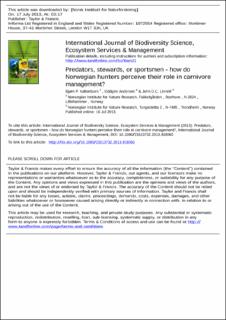Predators, stewards, or sportsmen – how do Norwegian hunters perceive their role in carnivore management?
Peer reviewed, Journal article
Published version

Åpne
Permanent lenke
https://hdl.handle.net/11250/3084945Utgivelsesdato
2013Metadata
Vis full innførselSamlinger
- Publikasjoner fra CRIStin - NINA [2364]
- Scientific publications [1392]
Originalversjon
10.1080/21513732.2013.818060Sammendrag
Hunting is increasingly seen as a management strategy in regulating large carnivore populations and reducing conflicts with human interests. A central theme in the carnivore debate is the role of the hunter in simulating natural predation and structuring of ecosystems. We surveyed a sample of Norwegian hunters to examine how they see their role in the ecosystem and to what extent environmental attitudes affect their perceptions of key functions of hunting. The hunters share a positive perception of themselves as responsible and law-abiding actors and important stewards of the ecosystem of great importance to wildlife management. Factor analysis revealed four underlying dimensions of the hunters’ perceptions of salient functions of hunting related to management, recreation, predation, and poaching. Environmental orientation was shown to affect perceptions of recreational and experiential functions of hunting, views on poaching, and perceptions of the stewardship role of hunters. Data on the multifaceted role of hunters can be important in the development of a socially legitimate hunting ethic in the increasingly complex sociopolitical landscape of carnivore management. hunters, hunting functions, carnivore management, ecosystem stewardship Predators, stewards, or sportsmen – how do Norwegian hunters perceive their role in carnivore management?
